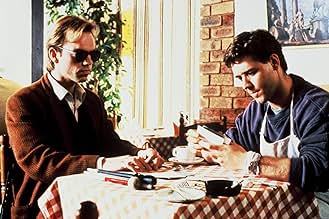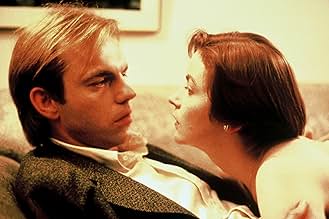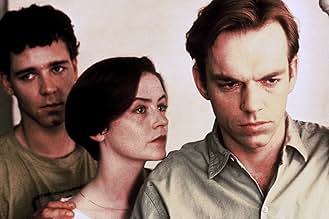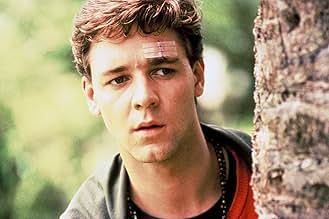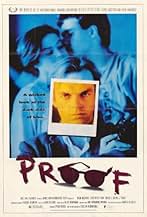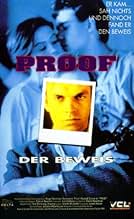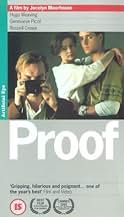PUNTUACIÓN EN IMDb
7,2/10
7,4 mil
TU PUNTUACIÓN
Añade un argumento en tu idiomaThe life of a blind photographer who is looked after by a housekeeper is disrupted by the arrival of an agreeable restaurant worker.The life of a blind photographer who is looked after by a housekeeper is disrupted by the arrival of an agreeable restaurant worker.The life of a blind photographer who is looked after by a housekeeper is disrupted by the arrival of an agreeable restaurant worker.
- Dirección
- Guión
- Reparto principal
- Premios
- 12 premios y 5 nominaciones en total
Geneviève Picot
- Celia
- (as Genevieve Picot)
Reseñas destacadas
This deliciously enticing bit of cinema from Down Under revolves around the activities of three people: A mistrustful blind man, a desperate, love-hungry woman, a misguided young man, and what happens when these three paths intersect.
Martin is a misanthropic blind man, whose unshakable mistrust of humanity compels him to compulsively take photographs of everything around him. So deeply-rooted is his paranoia that he believes his own mother rejected him because of his handicap, and so deceived him in her descriptions of the world. Martin took a picture--his first--of a garden his mother customarily described to him, as evidence that she had lied.
Martin's paranoia that anyone might be lying to him has shaped the rest of his life, growing up to become uncompromising and fiercely independent. He behaves callously in his only human interaction--with his rancorous housekeeper, Celia. Celia is obsessively, possessively in love with Martin. But their relationship is a prickly one, marked with cruelty and malice on both parts. Martin, aware of Celia's desire for him, uses the knowledge as a weapon--tormenting her by keeping her on, but rebuffing her attempts. In return, Celia spitefully rearranges the furniture so Martin will run into it and exploits his dependency on her to boost her own ego.
Years later, Martin is still a photographer, but now he wants someone he can trust to describe his first photo to him, thus giving him the 'proof' of a long-dead mother's love.
This someone happens to be Andy, a dishwasher at a local restaurant. But when Andy threatens to become too great an influence in Martin's life, Celia, feeling her territory has been violated, sets out to discredit Andy--using her sexuality to control both men.
"Proof" could all so easily have slipped into melodramatic theatrics, but the film skips nimbly along the line, managing to evade all potential traps. Most of the credit is due to the adroit, agile script and the outstanding performances from the cast.
Jocelyn Moorhouse, the film's director and writer, has the innate gift of comprehending, capturing, and conveying the human condition so aptly, so that the audience is deftly drawn into these characters' lives. The film doesn't rely on a contrived plot to induce interest; these ordinary characters are intrinsically fascinating simply because of who they are.
The acting is superb, making for a fabulous ensemble piece. Hugo Weaving renders a thoughtful performance as Martin, convincingly portraying a man who has closed himself off so effectively against the possibility that he might get hurt, that he has cut off the possibility of feeling. Genevieve Picot is likewise excellent, marvelously calculating, yet vulnerable as Celia. And Russel Crowe radiates an already unmistakable and irresistible charisma on-screen in this early role as Andy. His easy-going, honest, bloke-next-door charm is utterly appealing--a far cry from later roles in "L.A. Confidential" and "Gladiator", showing his incredible acting range.
This diabolically clever, enormously witty, and refreshingly original film can be hilariously funny at some times, genuinely heart-rending at others, and an all-round brilliant bit of cinema. Well-worth a look.
Martin is a misanthropic blind man, whose unshakable mistrust of humanity compels him to compulsively take photographs of everything around him. So deeply-rooted is his paranoia that he believes his own mother rejected him because of his handicap, and so deceived him in her descriptions of the world. Martin took a picture--his first--of a garden his mother customarily described to him, as evidence that she had lied.
Martin's paranoia that anyone might be lying to him has shaped the rest of his life, growing up to become uncompromising and fiercely independent. He behaves callously in his only human interaction--with his rancorous housekeeper, Celia. Celia is obsessively, possessively in love with Martin. But their relationship is a prickly one, marked with cruelty and malice on both parts. Martin, aware of Celia's desire for him, uses the knowledge as a weapon--tormenting her by keeping her on, but rebuffing her attempts. In return, Celia spitefully rearranges the furniture so Martin will run into it and exploits his dependency on her to boost her own ego.
Years later, Martin is still a photographer, but now he wants someone he can trust to describe his first photo to him, thus giving him the 'proof' of a long-dead mother's love.
This someone happens to be Andy, a dishwasher at a local restaurant. But when Andy threatens to become too great an influence in Martin's life, Celia, feeling her territory has been violated, sets out to discredit Andy--using her sexuality to control both men.
"Proof" could all so easily have slipped into melodramatic theatrics, but the film skips nimbly along the line, managing to evade all potential traps. Most of the credit is due to the adroit, agile script and the outstanding performances from the cast.
Jocelyn Moorhouse, the film's director and writer, has the innate gift of comprehending, capturing, and conveying the human condition so aptly, so that the audience is deftly drawn into these characters' lives. The film doesn't rely on a contrived plot to induce interest; these ordinary characters are intrinsically fascinating simply because of who they are.
The acting is superb, making for a fabulous ensemble piece. Hugo Weaving renders a thoughtful performance as Martin, convincingly portraying a man who has closed himself off so effectively against the possibility that he might get hurt, that he has cut off the possibility of feeling. Genevieve Picot is likewise excellent, marvelously calculating, yet vulnerable as Celia. And Russel Crowe radiates an already unmistakable and irresistible charisma on-screen in this early role as Andy. His easy-going, honest, bloke-next-door charm is utterly appealing--a far cry from later roles in "L.A. Confidential" and "Gladiator", showing his incredible acting range.
This diabolically clever, enormously witty, and refreshingly original film can be hilariously funny at some times, genuinely heart-rending at others, and an all-round brilliant bit of cinema. Well-worth a look.
Goodness, this is a terrific movie! I was lucky to get my hands on it, as it has VERY limited access where I'm from. If you can get your hands on this film, buy it! And if you don't like it....give it to me! ok, lol.
Proof is not a comedy. It is not even a black comedy (or black, BLACKEST comedy) though it has some moments that will make you laugh or smile broadly ("You killed ugly!"). It isn't a movie so heavy either that you'll feel like someone's been slapping you throughout the film either. It is very poignant, often surreal, but very, very intelligent. Proof is a very complex movie. In other words, you can't label the characters, 'evil' or 'good' and be done with it. You got to look deeper, and the actors subtly bring it out to an external medium and you'll see it. You just gotta remember to open your eyes.
Hugo Weaving was amazing here. In fact they were all good! Including the dog. Weaving really makes you think he's a blind person, and I almost thought for a second he was until I heard "Mr Anderson" ringing in my head again.
Proof is probably the movie that comes closest to reality in people's lives. And the drive-in scene is priceless.
Proof is not a comedy. It is not even a black comedy (or black, BLACKEST comedy) though it has some moments that will make you laugh or smile broadly ("You killed ugly!"). It isn't a movie so heavy either that you'll feel like someone's been slapping you throughout the film either. It is very poignant, often surreal, but very, very intelligent. Proof is a very complex movie. In other words, you can't label the characters, 'evil' or 'good' and be done with it. You got to look deeper, and the actors subtly bring it out to an external medium and you'll see it. You just gotta remember to open your eyes.
Hugo Weaving was amazing here. In fact they were all good! Including the dog. Weaving really makes you think he's a blind person, and I almost thought for a second he was until I heard "Mr Anderson" ringing in my head again.
Proof is probably the movie that comes closest to reality in people's lives. And the drive-in scene is priceless.
If you are a Russell Crowe fan like me you owe it to yourself to go rent this early example of his work, which deservedly won many Australian film awards in 1991. The plot centers around 3 people - Martin (Hugo Weaving), blind since birth and distrustful of the world, his manipulative housekeeper Celia (Genevieve Picot), and Martin's young friend Andy (Crowe), whom he meets early in the movie. Martin feels that everyone lies to him, even his mother, because he is blind and "because they can." He takes pictures of his world in order to have "proof" that what people are telling him is true. Andy is the person he recruits to describe his photographs to him. The acting is first rate and the movie is in turn sad, funny, dark, and heart warming. In the end, Martin learns that although no one is perfect, sometimes you just have to trust in love. Highly recommended!
Aussie Films are much like the Ford Motor Company. They're either a world beater - or mainstream mediocrity! This little offering is the Shelby Mustang of 90's movie-making.
Weaving is spellbinding (FORGET Agent Smith of THE MATRIX) as a blind photographer who has this unshakeable belief that people lie to him because of his blindness. His world revolves around photographs that others must visually interpret for him. He has a housekeeper that wishes she could do more than housekeep and the day he meets Andy, a dishwasher at the local restaurant, is the first day of a new beginning...but for who?
Suffice to say, Crowe as Andy shows all the portents of future stardom simply by being Russell Crowe. He is superb without really doing anything. For just a three character film, this is spellbinding stuff (much like THE INTERVIEW).
No more need be divulged. I would simply say this is one of the best films I have ever seen. It deserved every award it won. This is a 10! See it!
Weaving is spellbinding (FORGET Agent Smith of THE MATRIX) as a blind photographer who has this unshakeable belief that people lie to him because of his blindness. His world revolves around photographs that others must visually interpret for him. He has a housekeeper that wishes she could do more than housekeep and the day he meets Andy, a dishwasher at the local restaurant, is the first day of a new beginning...but for who?
Suffice to say, Crowe as Andy shows all the portents of future stardom simply by being Russell Crowe. He is superb without really doing anything. For just a three character film, this is spellbinding stuff (much like THE INTERVIEW).
No more need be divulged. I would simply say this is one of the best films I have ever seen. It deserved every award it won. This is a 10! See it!
This is, simply put, a great movie. I won't go into the plot too much, as many other commenters do a good job of that. But suffice to say, the trio of Russell Crowe, Hugo Weaving and Genevieve Picot do more acting in this movie than is contained in all of the blockbusters the first two have made since. (I haven't seen Picot in anything else, so can't comment on her subsequent choices.)
It is definitely a small movie. But that's not a bad thing. Most people's lives are small, and this movie is a good example of how even small events -- especially small events -- can have a huge impact on a person's life.
The essential thing about the movie is not that it's about a blind guy. It's about a guy who is incapable (at the beginning, anyway) of trust. Which is why he must have "proof" of everything around him in the form of photographs (which he, paradoxically, cannot see himself, but must have described to him). By the end of the movie, he has grown enough, or become desperate enough, to try to trust Andy, and show him the most "most important photo I've ever taken."
Genevieve Picot, as the suffering, love stricken housekeeper of Martin, is great. I wish I could see more of her work.
This movie also has some really funny moments, and yes, the funniest line is "I forgot." The second funniest is "Brian." See the movie and you will understand (and laugh your ass off too).
One final note: SEE THIS MOVIE!!!!! (Also: make sure to watch on a TV with good sound. It's important for the ending (the last moment before the credits roll).)
It is definitely a small movie. But that's not a bad thing. Most people's lives are small, and this movie is a good example of how even small events -- especially small events -- can have a huge impact on a person's life.
The essential thing about the movie is not that it's about a blind guy. It's about a guy who is incapable (at the beginning, anyway) of trust. Which is why he must have "proof" of everything around him in the form of photographs (which he, paradoxically, cannot see himself, but must have described to him). By the end of the movie, he has grown enough, or become desperate enough, to try to trust Andy, and show him the most "most important photo I've ever taken."
Genevieve Picot, as the suffering, love stricken housekeeper of Martin, is great. I wish I could see more of her work.
This movie also has some really funny moments, and yes, the funniest line is "I forgot." The second funniest is "Brian." See the movie and you will understand (and laugh your ass off too).
One final note: SEE THIS MOVIE!!!!! (Also: make sure to watch on a TV with good sound. It's important for the ending (the last moment before the credits roll).)
¿Sabías que...?
- CuriosidadesBecause his character, Andy, and Hugo Weaving's character, Martin, are supposed to be best mates, Russell Crowe set out to become good mates with Weaving by trying to share common interests. He would soon discover the only common interest they have together is that they are both huge fans of Doctor Who (1963).
- PifiasThe first time Martin enters his house, he gets surprised by Celia sitting and making a noise. However, since she is smoking, he could have smelled the smoke as soon as he had opened the door. Later in the movie, he is suggested to have a pretty sensitive nose for a perfume a lady is wearing in the veterinarian's office.
- Banda sonoraSymphony No. 5 in C Minor
(1809) (uncredited)
Written by Ludwig van Beethoven
First Movement played by the Melbourne Symphony Orchestra
Conducted by Nicholas Braithwaite
Selecciones populares
Inicia sesión para calificar y añadir a tu lista para recibir recomendaciones personalizadas
- How long is Proof?Con tecnología de Alexa
Detalles
Taquilla
- Recaudación en Estados Unidos y Canadá
- 524.668 US$
- Recaudación en todo el mundo
- 524.895 US$
- Duración1 hora 26 minutos
- Color
- Relación de aspecto
- 1.85 : 1
Contribuir a esta página
Sugerir un cambio o añadir el contenido que falta

Principal laguna de datos
By what name was La prueba (1991) officially released in India in English?
Responde


